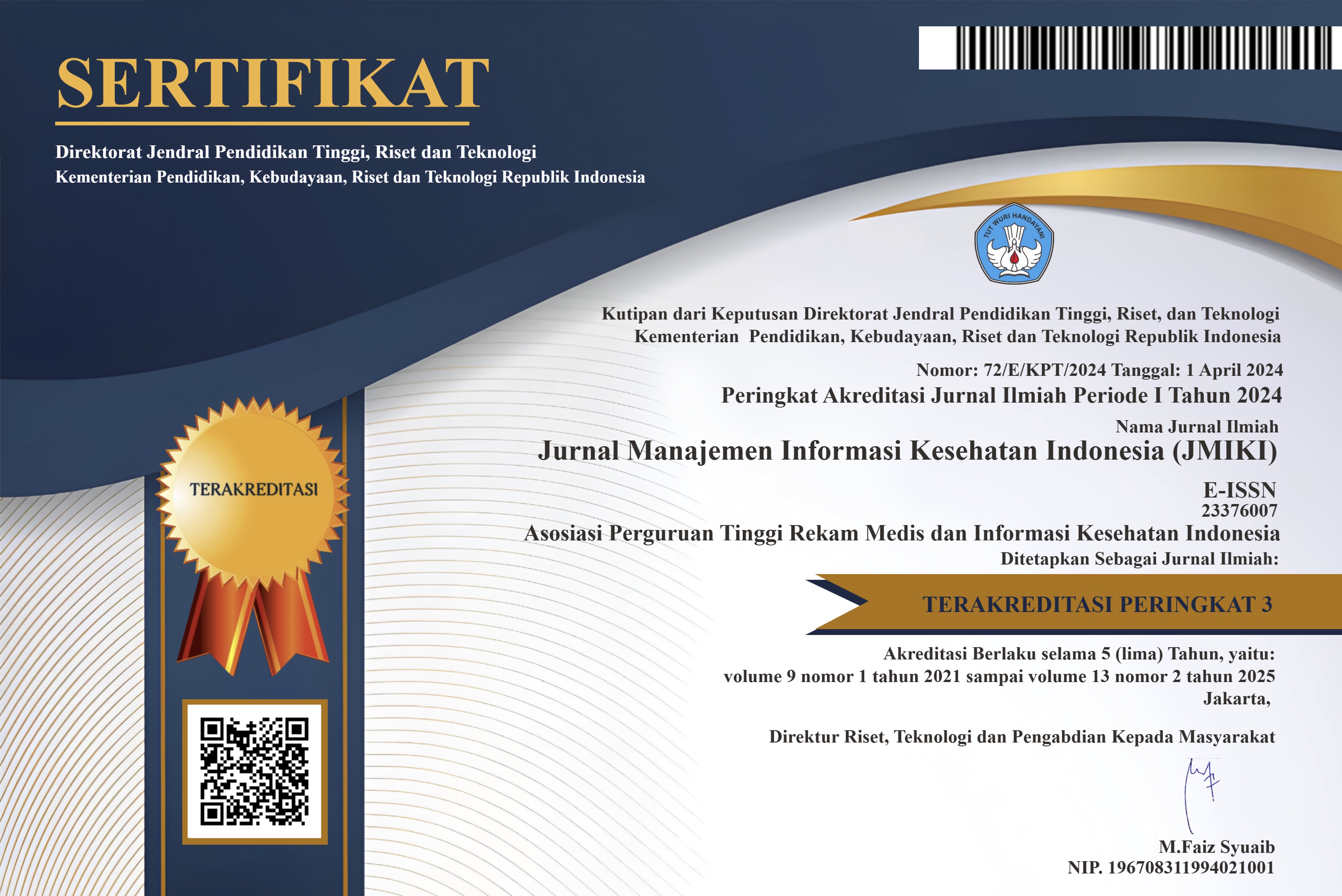Kontribusi Faktor Kognitif Terhadap Skor Kelulusan Uji Kompetensi
DOI:
https://doi.org/10.33560/jmiki.v8i1.260Keywords:
kognitif, skor kelulusan, uji kompetensiAbstract
Tujuan penelitian ini adalah untuk mengetahui kontribusi faktor kognitif terhadap skor kelulusan uji kompetensi program studi rekam medis dan informasi kesehatan (RMIK) di Indonesia. Rancangan penelitian yang dipilih adalah observasional analitik dengan pendekatan cross sectional. Populasi penelitian ini adalah seluruh mahasiswa RMIK semester terakhir di Indonesia yang mengiukuti try out uji kompetensi. Sampel sebesar 597 mahasiswa ditentukan dengan menggunakan teknik cluster random sampling. Analisis data dengan menggunakan regresi linier berganda. Hasil penelitian terdapat pengaruh variabel kognitif terhadap skor kelulusan uji kompetensi prodi diploma tiga RMIK (p<0.05,95CI) dan memiliki kontributor sebesar 27.6% terhadap skor uji kompetensi. Simpulan penelitian ini adalah faktor kognitif memiliki kontribusi terhadap skor uji kompetensi prodi diploma tiga RMIK.Â
Downloads
References
Permenkes R. Peraturan Menteri Kesehatan Republik Indonesia dan Menteri Kebudayaan Republik Indonesia Nomor 36 Tahun 2013 Nomor1/IV/PB/2013 Tentang Uji Kompetensi Bagi Mahasiswa Perguruan Tinggi Bidang Kesehatan. Jakarta; 2013. 3-7 p.
Masfuri. Keputusan Panita Nasional Uji Kompetensi Mahasiswa Pendidikan Keperawatan dan Kebidanan No.581/PUK-Nas/XI/2018 Tentang Hasil Uji Kompetensi Mahasiswa Program Ners. Jakarta; 2018. p. 2016–8.
Pusporini L dan LS. Analisis Faktor yang Mempengaruhi Capaian Kelulusan Uji Kompetensi Ners Mahasiswa Program Profesi. CAKRAWALA Pendidik. 2018;XXXVI(2):306–20.
Lisbet Octovia Manalu; Arie Joseph Pitono. Identifikasi Kelulusan UKNI Berdasarkan Hasil Try Out Di STIKES Rajawali Bandung. In: PROSIDING Seminar Nasional & Lokakarya Uji Kompetensi Tenaga Kes- ehatan. 2017.
Condon J, Barefield A. Assessment of Success on the RHIA Certification Examination : A Comparison of Baccalaureate Program Graduates and Postbaccalaureate Certificate Program Graduates. Perspect Heal Inf Manag. 2012;Fall:1–7.
Peterson J. Encouraging Health Information Management Graduates to Pursue Cancer Registry Careers. J Registry Manag. 2016;43(1):37–41.
Riley M, Robinson K, Prasad N, Gleeson B, Barker E, Wollersheim D, et al. Workforce survey of Australian graduate health information managers: Employability, employment, and knowledge and skills used in the workplace. Heal Inf Manag J [Internet]. 2019 Apr 21 [cited 2019 May 28];183335831983929. Available from: http://journals.sagepub.com/doi/10.1177/1833358319839296
Condon J. Predicting Registered Health Information Administrator Examination Scores. 2013;
Duckworth AL, Seligman MEP. Self-Discipline Gives Girls the Edge : Gender in Self-Discipline , Grades , and Achievement Test Scores. 2006;98(1):198–208.
Wang M, Willett JB, Eccles JS. The assessment of school engagement : Examining dimensionality and measurement invariance by gender and race / ethnicity. J Sch Psychol [Internet]. 2011;49(4):465–80. Available from: http://dx.doi.org/10.1016/j.jsp.2011.04.001
Margareth A. Gender differences in academic achievement : A matter of contextual classroom influence ? 2019;8(1):1–20.
Wittenzellner M. Differences in ELA and Math Test Score Outcomes : Comparing Urban, Rural and Suburban Schools. 2015;(May):1–32.
Sahin M. Correlations of Students’ Grades, Expectations, Epistemological Beliefs and Demographics in a Problem-Based Introductory Physics Course. Int J Environ Sci Educ. 2009;4(2):169–84.
Ghaffari R, Mirghafourvand M, Abbasian R, Janati A. Comparison of Competencies of Nursing Graduates of Azad Private University and State Public University. Biosci Biotechnol Res Asia. 2015;12(December):2649–56.
Aaronson WE, Evashwick CJ. GLOBAL EDUCATION OF HEALTH MANAGEMENT. Frontiers in Public Health; 2019.
Dey A. Consumer health informatics: an overview of patient perspectives on health information needs. HIM J. 2004;33(4):121–6.
Condon J V, Barefield AC. Predicting Professional Examination Outcomes : A Case of the Predicting Professional Examination Outcomes : A Case of the Registered Health Information Administration Certification Examination. 2016;(January).
Daley L1, Kirkpatrick BL, Frazier SK, Chung ML MD. Predictors of NCLEX-RN success in a baccalaureate nursing program as a foundation for remediation. J Nurse Educ. 2003;42(9):390–398.
Newton;Laureen H.Smith Magnan. Predicting Early Academic Achievement in a Baccalaureate Nursing Program. J Prof Nurs. 2007;23(3):144–9.
Marks A, McIntosh J. Achieving meaningful learning in health information management students: The importance of professional experience. Heal Inf Manag J. 2006;35(2):14–22.
Simpson, K. and Freeman R. Reflective practice and experiential learning: tools for continuing professional development. Dent Update. 2004;35(5):281–4.
Rodriguez F, Kataoka S, Nili A, Warschauer M. Do spacing and self-testing predict learning outcomes ? 2018;
Hartwig MK and Dunlosky J. Study strategies of college students: Are self-testing and scheduling related to achievement? Psychon Bull Rev. 2012;19(1):126–34.
Mcneill MH, Brockmeier LL. Relationships between Academic Program Variables and Success on the Registered Health Information Administrator Certification Examination. Perspect Heal Inf Manag. 2005;2(4).
Baker JJ. Dispositional coping strategies, optimism, and test anxiety as predictors of specific responses and performance in an exam situation [Internet]. 2003. Available from:https://searchproquestcom.proxy1.lib.uwo.ca/psycinfo/docview/305297603/fulltextPDF/20FAC2CA2DD14A29PQ/3?ac countid=15115
Fernandez-Castillo, & Caurcel MJ. State test-anxiety, selective attention and concentration in university students. Int J Psychol. 2015;50(4):256–71.
Board IR, Antonio S. Predictors of student success in the US Army Graduate Program in Anesthesia Nursing. 2007;75(5):339–46.
Abdelhak, M., S. Grostick, M. A. Hanken and EJ. Health Information: Management of a Strategic Resource. 2nd ed. Philadelphia: W. B. Saunders;
Wholey J. Assessing the Feasibility and Likely Usefulness of Evaluation.Handbook of Practical Program Evaluation. San Francisco: Jossey-Bass; 1994. 15-39 p.
Bates M, Black C, Blair F, Davis L, Ingram S, Lane D, et al. Perceptions of health information management educational and practice experiences. Perspect Health Inf Manag [Internet]. 2014;11:1d. Available from: https://www.scopus.com/inward/record.uri?eid=2-s2.0-85006257607&partnerID=40&md5=e68a2a06069e0a23c616a2b813bd7e4b




